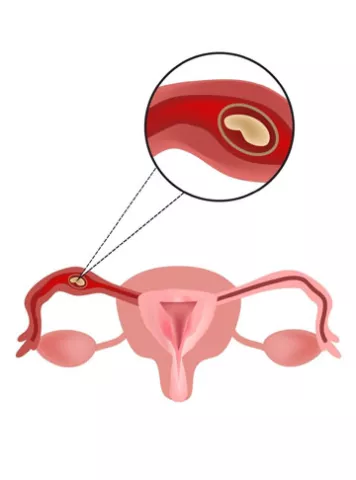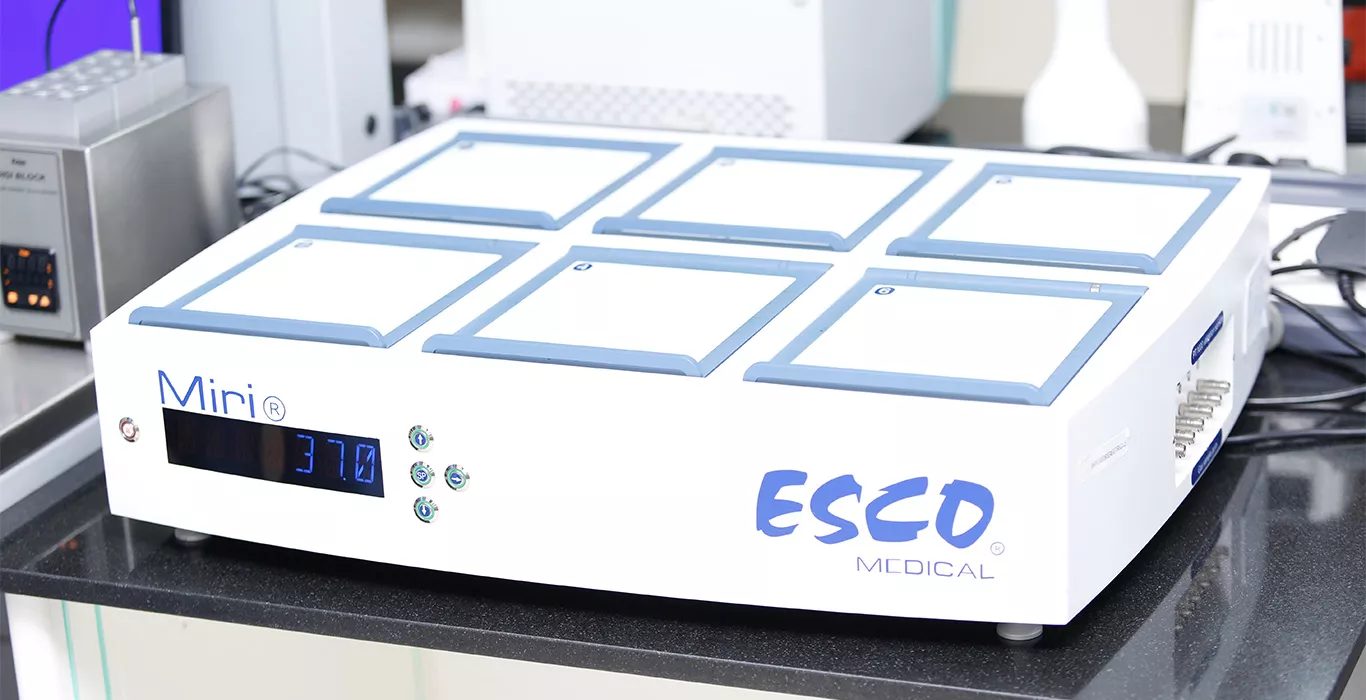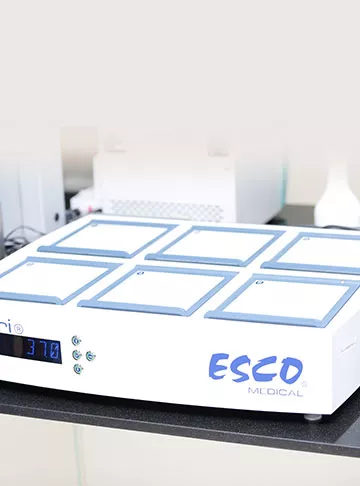Synopsis
Benchtop incubator, Benchtop incubator in the IVF lab, DECONTAMINATION OF BENCHTOP INCUBATOR CAN BE DONE BY FOLLOWING SOURCES
By Rahul Manoj, Embryologist on February 25, 2020
Benchtop incubator in the IVF lab!
Benchtop incubator
In the IVF lab, for Quality control and maintenance of advanced embryo incubation systems, supporting dynamic embryo development plays a crucial role in assisted reproductive outcomes. Essential environmental variables to consider within the culture system includes the air-quality, pH, osmolality, culture medium, temperature, and humidity. These factors can impact the performance of an embryo culture incubator. With the fortune of advanced technology, it is made possible to equip an incubator that has the ability to have control over multiple environmental variables.
Benchtop incubator in the IVF lab!
Benchtop incubators being an upgraded version of box incubators aims at providing a comfortable and undisturbed way of the embryo development system.
These are well known in the IVF industry by their performance of achieving better fertilization (>72%) good blastocyst (>20%) and ultimately a better pregnancy rate (>64%).
Some key factors which distinguish benchtop incubators from conventional incubators that providing the best crib for in-vitro embryo development include-
1. Multi-chamber system: provides an undisturbed embryo-culture system, where the exposure of one chamber does not affect the internal regulated environment of other chambers
2. Tri-gas system.
3. Accuracy and consistency: Less time is taken for recovery of gases and temperature and minimal variation
4. Avoids the dish replacement accidents etc.
Besides! It is very important to focus on Quality control and management of these embryo cribs to achieve less potential variations in a routine IVF practice.
Considering the following measurements can aid in achieving the quality performance of the benchtop incubator in routine IVF practice.
a. The first and foremost step is to maintain an aseptic way of working in routine IVF practice, mainly during and
after the time of touching embryo culture incubators.
b. The routine monitoring of cylinder and the measuring accuracy of gases, using Infrared testers for example CO2
analyzer.
c. Regular temperature accuracy checkup using a thermometer.
d. Make sure of using the high-quality gas supply.
e. Checking the tubing regularly for any leakage, block or color change.
f. Keeping the incubator on a stable surface and keeping the surroundings clean and devoid of
littering.
g. Changing the CODA inline filter every 6 months
h. Cleaning and calibrating the incubator every 3 months to avoid any microbial contamination
i. Checking for the microbial contamination and decontamination
DECONTAMINATION OF BENCHTOP INCUBATOR CAN BE DONE BY FOLLOWING SOURCES:
HEAT:
By doing the auto start of the incubator, where the temperature within the incubator reaches above 70⁰C. Here, most of the heat liable micro-organisms can be removed.
IRRADIATION:
Using shorter wavelength radiation such as UV, a unique characteristic of UV light is that a specific range of its wavelengths, those between 200 and 300 nanometers (billionths of a meter), are germicidal.
Most of the bacteria, viruses, and protozoans can be unfastened by effective UV radiation, where these micro-organisms become incapable of reproducing and soon vanishes. The compartments, shelves, and chambers of benchtop incubators can be exposed to UV rays for the decontamination process.
H2O2:
This process has several steps, where after the H2O2 incorporation into the benchtop incubator chamber, the chamber doors get locked, this allows the vaporization of H2O2 at low temperature. This also allows the passage of the vapor to each and every corner of the incubator, here there is no requirement of removing the chambers, shelves or any tubing required. The overall flow of this vapor disinfects the entire incubator within 3 hours by killing the micro-organisms.
This works as an in-situ fumigation process.
COPPER ALLOY:
Incorporation of the copper alloy lining and stainless steel in the benchtop incubators prevents possible contamination and aids in easy surface cleaning.
HEPA FILTER / CODA INLINE FILTER:
These air filter systems control and trap about 99.97% flow of unwanted particles having a size above 0.3 microns. Replacement of these filters should be done once in every 6 months for better and efficient performance.
70% ALCOHOL DECONTAMINATION:
This disinfectant is used in rare cases for the embryo culture incubators due to their intense VOC persistence. To remove the ever-existing microbial growth and for the effective sterilization, cleaning with 70% alcohol can be practiced. But, it is mandatory to wipe several times with distilled water followed by 70% alcohol, until removing each and every residue of alcohol is very important.
Along with these, the quality performance of the incubator can also be affected by the following reasons
1. Increased electric fluctuations
2. Quality of the gas supplied
3. Opening and Exposing the chamber several times
4. Negligence of Technical issues such as sensor issues
5. Improper removal of left over alcohol, UV, and H2O2residues
With collective information, for the efficient performance of the benchtop incubator or any other incubators used for embryo culturing, the quality control for embryo and management plays a crucial role in the formation of the healthy and quality blastocyst in a routine IVF practice. The higher the quality performance of the incubator, higher is the IVF success rate.
At Indira IVF and fertility center, our fertility experts are keen to help and resolve all your queries related to infertility or IVF. You can book your appointment for a free consultation now.
You may also link with us on Facebook, Instagram, Twitter, Linkedin, Youtube & Pinterest
Talk to the best team of fertility experts in the country today for all your pregnancy and fertility-related queries.
Comments
Articles
2023


Guide to infertility treatments IVF
एक्टोपिक प्रेगनेंसी के लक्षण, कारण और इलाज
प्रेगनेंसी की खबर महिला को का�...
2023


Guide to infertility treatments
Hypertension- How it impacts Fertility and Pregnancy
Blood pressure problems are no longer just an old-age problem. It is steadily ...
2023


Guide to infertility treatments
Managing Pregnancy, Infertility, and Career with Confidence
Before we start, let us ask you a question! What are your fondest Mother’s D...
2023


Male Infertility Guide to infertility treatments
अशुक्राणुता (एजुस्पर्मिया) के कारण, लक्षण और उपचार (Azoospermia in Hindi)
माता-पिता बनने से महरूम रहना भ...
2023


IVF Guide to infertility treatments
टेस्ट ट्यूब बेबी का खर्च कितना आता है (What is the test tube baby cost in hindi)
पिछले कुछ वर्षों में टेस्ट ट्�...


Guide to infertility treatments Infertility Tips
पीआईडी: पेल्विक इनफ्लैमेटरी डिजीज और निःसंतानता
पीआईडी - पेल्विक इनफ्लैमेटरी �...
2022


Guide to infertility treatments IVF
थाइरायड असंतुलन के कारण हो सकती है निःसंतानता, आईवीएफ से कैसे हो सकता है।
पिछले कुछ वर्षों में थायराइड �...


IVF Guide to infertility treatments
भारत में आईवीएफ ट्रीटमेंट में कितना खर्चा होता है
पिछले कुछ वर्षों में टेस्ट ट्�...


Guide to infertility treatments
Varicocelectomy
What is Varicocelectomy? Varicocelectomy is a surgical procedure performed ...
Tools to help you plan better
Get quick understanding of your fertility cycle and accordingly make a schedule to track it
















